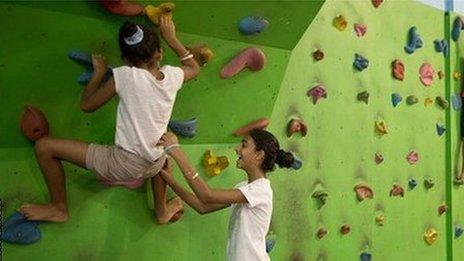Disability no barrier to climbing, says 'limbless mountaineer'
- Published
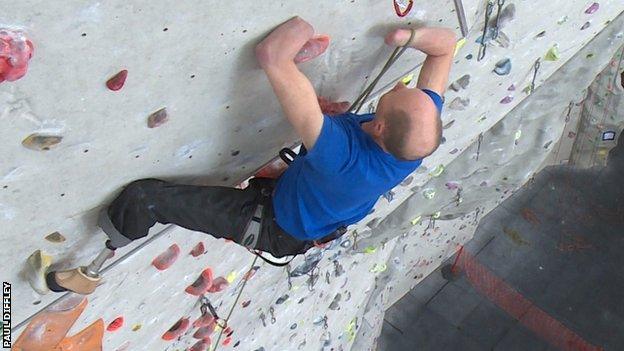
Quadruple amputee Jamie Andrew helped organise Scotland's first paraclimb event
Fifteen years ago my brother, Jamie Andrew, lost both his hands and feet to severe frostbite after getting caught in a five-day storm in the alps.
His climbing partner, Jamie Fisher died of hypothermia. My brother, now 45, survived but had to have all four limbs amputated to save his body from septic shock.
Since then my "limbless mountaineer" sibling has been attempting to push back the boundaries of what people with disabilities can achieve.
His latest venture has been to encourage other people with disabilities to try rock climbing.
He was one of the organisers behind Scotland's first paraclimb competition, held at the Edinburgh International Climbing Arena near Ratho on Sunday. I went along to see what he was up to.
Disability rock climbers go out on a limb to promote new paraclimbing opportunities in Scotland.
When you walk into the world's largest indoor climbing arena, you can't fail to be impressed. Built into an old rock quarry, it boasts thousands of square metres of wall with routes of up to 28m high.
At first glance I can see that the walls are busy with people carefully, methodically and gracefully scaling the walls.
Then I notice some of the climbers have a prosthetic leg or a missing arm. On the ground are a couple of discarded wheelchairs, and a guide dog left to watch.
As we walk around my brother causally reels off introductions: Keith, an amputee base jumper; Alan, who lost a leg in motorbike accident; Cody, a US war veteran...
Jamie adds quickly: "But I don't want to imply rock climbing is just for people into extreme thrills."
As if to illustrate his point, I turn round and see a boy who looks about three or four, climbing on a wall behind me.
There is something very natural about climbing. It presents a physical challenge, as well as an exercise in problem solving.
It's an individual sport which can be done at any level, yet it also involves selfless team work between climbing partners.
There's not much difference between able-bodied climbing and paraclimbing.
Many paraclimbers can simply compensate for their disabilities through ingenuity and gutsy determination.
But there are also adaptive devices available, such as special harnesses and pulley systems, and prosthetic climbing feet for leg amputees.
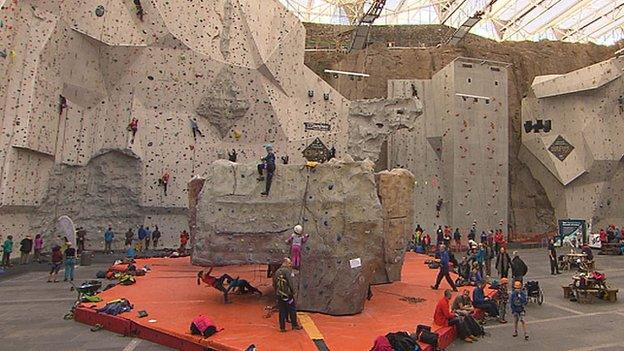

"Paraclimbing is entirely inclusive," explains Jamie. "We don't care if your disability is a physical one, or whether it's a mental disability.
"I believe everyone should have the chance to try climbing and see if it's something they enjoy, and even to be able compete at the highest level.
"Two weeks ago I wasn't sure if anyone would show up, but there are about 30 people taking part in the competition another 30 or so have turned up for the 'come and try' session."
Ryan MacDonald, 33, a successful wheelchair tennis player, is one of those trying climbing for the first time.
After trying out the pulley system, he says he'll definitely be coming back with his kids.
"It's so refreshing to see that the guys here are so open," he says. "Even if someone comes along with a disability that doesn't seem to be catered for, they'll make sure it happens for them.
"A lot of times those people would have been left as spectators.
"With disability sport, it's sometimes just seen as a separate disability club, but this is something you can come and take part with your friends and family, which I think is absolutely massive for people."
I watch Kat Langton stand up from her wheelchair and walk tentatively over to climb a wall, leaning on both her boyfriend and coach.
The 22 year old has cerebral palsy, which affects her muscle control and movement.
"For me climbing is basically freedom," she tells me later. "I get on the wall and it's like I'm free, just like everyone else.
"Someone actually once said to me that I don't look any different from anyone else when I'm on the wall, and that is the essence of climbing for me."
She's right - on the wall her limb movement looks incredibly strong and controlled.
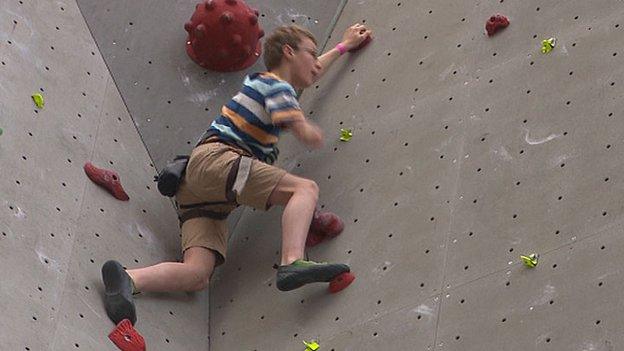
Matthew Phillips, 13, hopes to make it on to the GB Paraclimb team
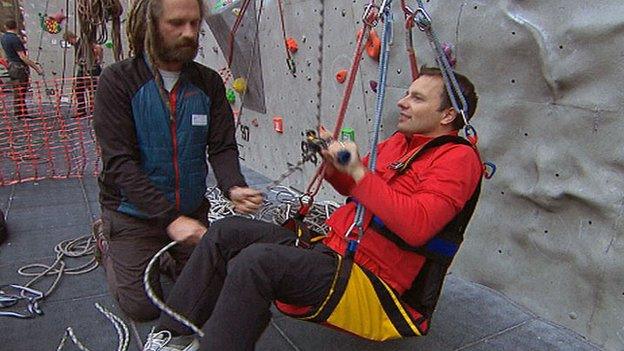
Wheelchair sportsman Ryan MacDonald tries the pulley system
Cody Elliott has such a "big fire" in his heart for paraclimbing that he's travelled from California especially for the event.
Three years ago the 24-year-old was blown up by an Improvised Explosive Device (IED) in Afghanistan.
The US veteran suffered facial injuries and his left leg was amputated above the knee.
He says: "I've seen the worst it can get for people in terms of pain medication and not wanting to live life again.
"Just last year in 2013 I was in an bad place, but since I found rock climbing it's saved my life.
"I truthfully believe in my mind it can save other people's lives.
"If I could come all the way from the States and influence a couple of lives here, hopefully they can take that into their own community."
Cody's spirit of comradeship and support is evident in all the competitors.
Even though these climbers are taking part in a competition, they shout up encouragement and offer suggestions on how to master tricky moves. Everyone cheers when someone reaches the top of a climb.
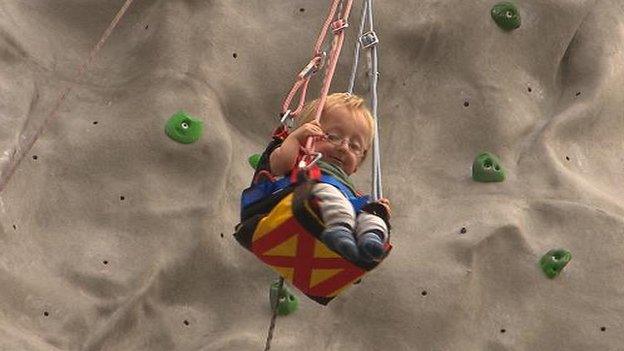
Ethan Brown, 6, is one of the youngest participants
The biggest cheer of the day goes to Ethan Brown who is trying climbing for the first time.
The six-year-old from Musselburgh has brittle bone disease, which has prevented his bones from growing properly and means he has to use a wheelchair.
The slightest of knocks can cause his bones to fracture. Understandably his parents find watching him scale the wall a nail-biting experience.
The arena holds its breath as Ethan towers higher and higher above his wheelchair, laughing, kicking and shouting: "higher" each time he edges further into the sky.
Watching the pure joy on Ethan's face proves to me that everyone should indeed have the opportunity to try rock climbing.
A day earlier, Jamie and the other event organisers held a paraclimb training day for climbing wall instructors from throughout Scotland.
"Things don't end here today," he says. "We want anyone with a disability to be able to go to their local climbing wall and have their needs catered for.
"We want to ensure paraclimbing continues to grow as a sport in Scotland."
For more information about paraclimbing in Scotland contact MCofS Sport Development Officer kev@mcofs.org.uk.
If you want to find out about rock climbing in general, you can also look at our Get Inspired dedicated page on the sport.
- Published17 September 2018
